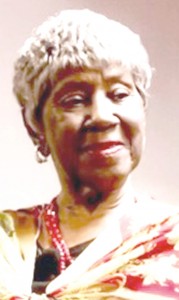Lucille Bridges, mother of civil rights activist Ruby Bridges, dies at 86
16th November 2020 · 0 Comments
By Fritz Esker
Contributing Writer
Lucille Bridges, mother of civil rights activist Ruby Bridges, died last Tuesday, November 10, 2020. She was 86.
On November 14, 1960, Lucille walked with then-6-year-old Ruby past crowds screaming racial slurs as Ruby became the first Black student at the previously all-white William Frantz Elementary School on N. Galvez Street in New Orleans (now the site of Akili Academy of New Orleans). Ruby’s first walk to school, surrounded by U.S. Marshals, would be immortalized in the Norman Rockwell painting, “The Problem We All Live With.” Rockwell’s work appeared in the news last week after an artist updated it to include Vice President-Elect Kamala Harris walking alongside Ruby.
Last Tuesday, Ruby Bridges left a tribute to her mother in a post on her Instagram page. The post read: “Today our country lost a hero. Brave, progressive, a champion for change. She helped alter the course of so many lives by setting me out on my path as a six year old girl. Our nation lost a mother of the Civil Rights Movement today. And I lost my mom. I love you and am grateful for you. May you rest in peace.”
In a 1999 article in The Dallas Morning News, Ruby recalled that on the morning of her first day at Frantz Elementary, Lucille told her, “Now, Ruby, you’re going to a new school today and you better behave.”
Lucille Bridges was raised on a sharecropping farm in Mississippi. She and her husband, Abon, took the family to New Orleans when Ruby was two years old. Lucille wanted her daughter to receive the educational opportunities she had been denied as a child. Abon, a Korean War veteran, disagreed with the choice to send her to Frantz because he wanted her to feel safe and welcomed. Lucille succeeded in winning over her husband.
In a 2016 interview with the Spring Branch Independent School District, Lucille recalled Ruby’s first day at Frantz.
“They had so many United States Marshals, so many people just standing, screaming and hollering ‘2, 4, 6, 8, we don’t want to integrate,’” Lucille said. “They just started pitching eggs and tomatoes and everything, but they didn’t hit us because the marshals really took care of us…All those people calling us names and things, you just had to charge that to their ignorance and just go on, be yourself. Go on and God will bring you through.”
In 1985, Lucille Bridges received the A.J. Chapital Award from the New Orleans branch of the NAACP (its highest honor) for her courage. She spoke to The Associated Press that year about Ruby’s first days at Frantz.
“(Ruby) didn’t get afraid, but she kept asking why all those people were making that noise…I don’t think she knew what was going on,” Lucille said.
Lucille told The Associated Press she did not realize how dangerous the situation was until she returned home with Ruby that afternoon. There, she was told that the federal government would protect their house 24 hours a day.
New Orleans Mayor LaToya Cantrell released a statement on Lucille Bridges last Tuesday.
“Today we mourn the loss of one of the mothers of the Civil Rights Movement in New Orleans with the passing of Lucille Bridges – mother of five, including Ruby Bridges, who as a first-grader in 1960 was one of six African-American children to integrate the all-white William Frantz Elementary School” Cantrell said. “Lucille’s strength was unbounded during this period…seeing the action as an opportunity to help all Black children…I think I speak for all mothers who want the best for their children when I hope for the same moral courage, bravery, and love as that of Lucille Bridges. May she rest in God’s perfect peace.”
Louisiana Governor John Bel Edwards echoed Mayor Cantrell’s praise on Twitter, where he wrote, “The courage and strength of Mrs. Lucille Bridges, a hero of the Civil Rights Movement, not only helped create a better world for her children, including her daughter Ruby Bridges, but for all children.”
This article originally published in the November 16, 2020 print edition of The Louisiana Weekly newspaper.




